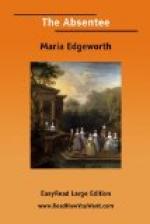‘Then I shall be quite happy. Go on!’
The carriage drove on.
’I do believe Colambre’s ill; I never saw a man look so ill in my life—did you, Grace?—as he did the minute we drove on. He should take advice. I’ve a mind, cried Lady Clonbrony, laying her hand on the cord to stop the coachman—’I’ve a mind to turn about, tell him so, and ask what is the matter with him.’
‘Better not!’ said Miss Nugent; ’he will write to you, and tell you—if anything is the matter with him. Better go on now to Buxton!’ continued she, scarcely able to speak. Lady Clonbrony let go the cord.
’But what is the matter with you, my dear Grace? for you are certainly going to die too!’
‘I will tell you—as soon as I can; but don’t ask me now, my dear aunt!’
‘Grace, Grace! pull the cord!’ cried Lady Clonbrony—’Mr. Salisbury’s phaeton!—Mr. Salisbury, I’m happy to see you! We’re on our way to Buxton—as I told you.’
‘So am I,’ said Mr. Salisbury. ’I hope to be there before your ladyship; will you honour me with any commands!—of course, I will see that everything is ready for your reception.’
Her ladyship had not any commands. Mr. Salisbury drove on rapidly.
Lady Clonbrony’s ideas had now taken the Salisbury channel.
’You didn’t know that Mr. Salisbury was going to Buxton to meet you, did you, Grace?’ said Lady Clonbrony.
‘No, indeed, I did not!’ said Miss Nugent; ‘and I am very sorry for it.’
’Young ladies, as Mrs. Broadhurst says, “never know, or at least never tell, what they are sorry or glad for,"’ replied Lady Clonbrony. ’At all events, Grace, my love, it has brought the fine bloom back to your cheeks; and I own I am satisfied.’
CHAPTER XV
‘Gone! for ever gone from me!’ said Lord Colambre to himself, as the carriage drove away. ’Never shall I see her more—never will I see her more, till she is married.’
Lord Colambre went to his own room, locked the door, and was relieved in some degree by the sense of privacy; by the feeling that he could now indulge his reflections undisturbed. He had consolation—he had done what was honourable—he had transgressed no duty, abandoned no principle—he had not injured the happiness of any human being—he had not, to gratify himself, hazarded the peace of the woman he loved—he had not sought to win her heart. Of her innocent, her warm, susceptible heart, he might perhaps have robbed her—he knew it—but he had left it untouched, he hoped entire, in her own power, to bless with it hereafter some man worthy of her. In the hope that she might be happy, Lord Colambre felt relief; and in the consciousness that he had made his parents happy, he rejoiced. But, as soon as his mind turned that way for consolation, came the bitter concomitant reflection, that his mother must be disappointed in her hopes of his accompanying her home, and of his living with her in Ireland; she would be miserable when she should hear that he was going abroad into the army—and yet it must be so—and he must write, and tell her so. ’The sooner this difficulty is off my mind, the sooner this painful letter is written, the better,’ thought he. ‘It must be done—I will do it immediately.’




